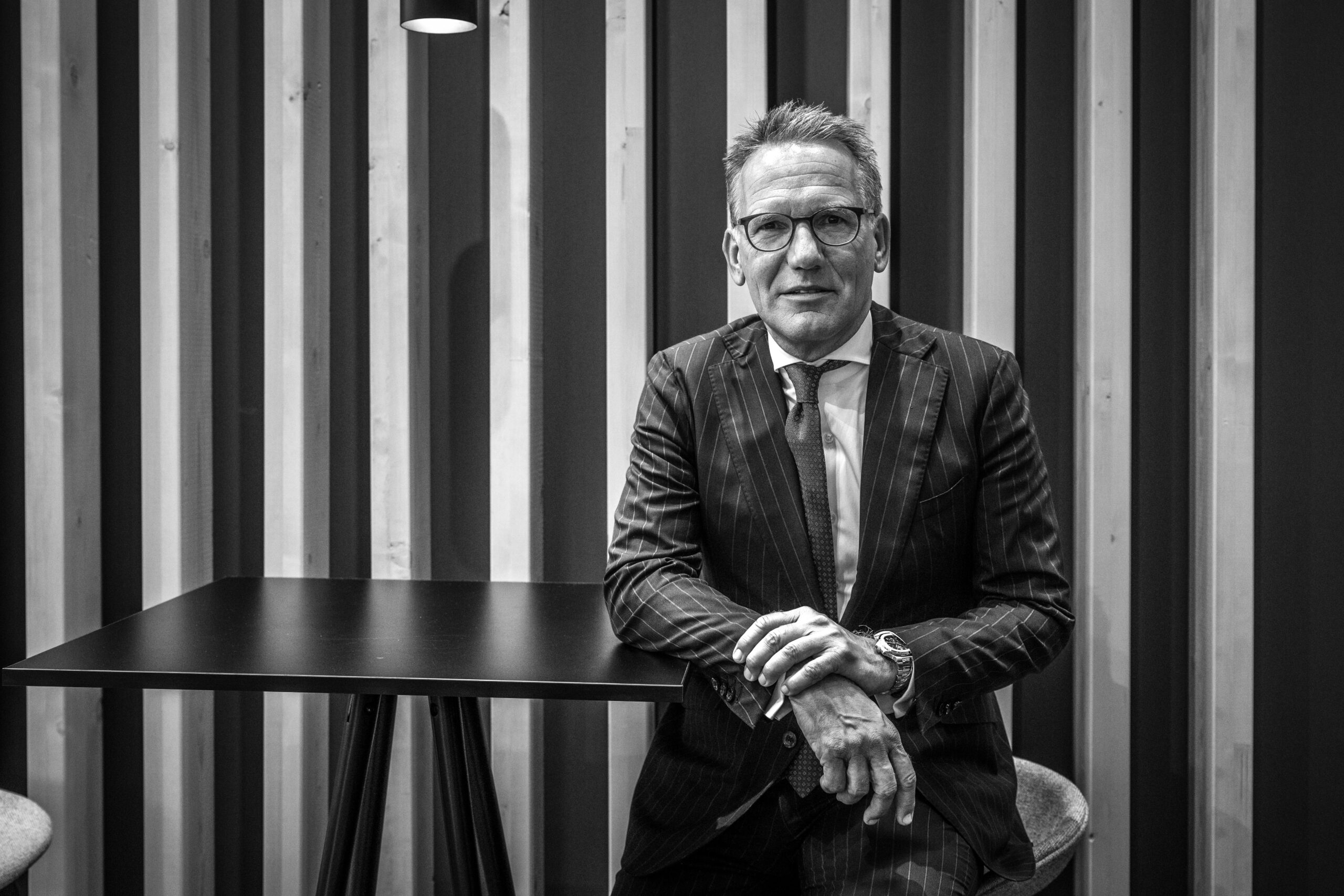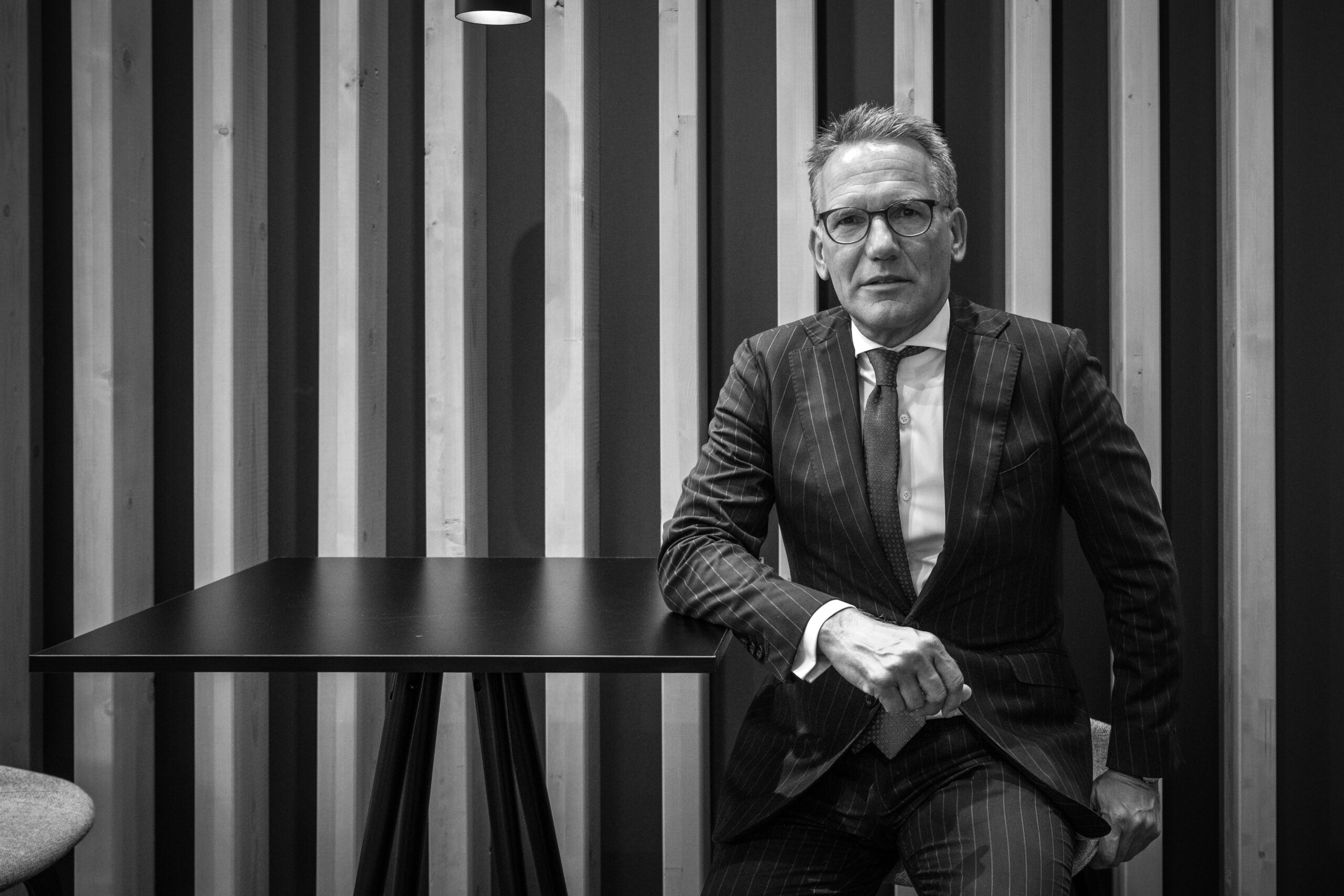
Nadin Heinich: In recent months, there’s been a lot of news about property developers facing insolvency. What makes the current situation in the real estate sector so challenging?
Ulrich Höller: The real estate sector is experiencing its most severe crisis in decades due to a combination of challenges. On one hand, construction and financing costs have risen sharply. Added to this are the demands of climate protection. Our industry is one of the main contributors to high CO₂ emissions – making it a crucial part of the solution. At the same time, the way offices are used is changing, with a strong focus on home office and New Work principles. These latter trends, simply put, lead to higher costs.
We’ve faced crises before and are accustomed to change. What’s new this time are the extreme challenges caused by the rapid rise in interest rates. This sudden shift is especially impactful because our industry moves at a slower pace. Our products are immobile. Unlike the automotive sector, we can’t simply halt production lines. Real estate projects are often multi-year undertakings. The sharp increase in interest rates has had a dual effect: first, a significant rise in financing costs, which haven’t been an issue in recent years, and second, major impacts on capital investment strategies. In practical terms, this translates to rapidly falling property values in a short time. The critical issue for many developers is the convergence of these two factors: rising costs that increasingly outpace the potential future sale prices of their projects.
Nadin Heinich: Could you explain the impact of higher interest rates more concretely?
Ulrich Höller: I’ll try to simplify a complex issue: Capital seeks returns. When overall interest rates are low, prices adjust accordingly. If you only pay 1% interest on a loan, or bond yields are similarly low, investors are satisfied with a 3% return. Their money earns a good return, exceeding the interest they pay on borrowed funds. If an investor expects a 3% return on a property, I can sell it for roughly 33 times the annual rental income. But if the expected return rises to 5%, the sales price drops to only 20 times the annual rent.
For example, a property generating five million euros annually in rent might sell for over 150 million euros with a 3% yield expectation. Now, with a 5% yield expectation, it might only fetch 100 million euros. Developers typically earn a 10 to 20% profit margin on such projects if things go well. A 15% drop in value means breaking even, with no profit. But a 30 to 40% drop results in a capital loss, with equity being the first to go. Compounding this, banks providing financing often base loans on prior valuations, such as 150 million euros. If the property value falls, developers must either repay the loan or inject more equity. Banks operate under strict regulations. This creates the toxic market conditions we see now. That’s why we’re hearing about developer insolvencies, and it’s increasingly affecting long-term property investors too.
Nadin Heinich: How do you determine the “true value” of a property?
Ulrich Höller: As footballers might say, “the truth is on the pitch” – in our industry, this means the true value of a property is only confirmed during the sales process, where the current market conditions determine the price. Using our earlier example: Before the war in Ukraine, I might have sold a property for 150 million euros. Today, that same property might sell for only 100 million. The key question is: When can – or must – I sell? If the bank demands repayment now, the value is dictated by the current market. However, if I can wait for a better market phase, I might sell later for, say, 130 million euros. That, too, becomes the “truth”. In practice, there is the actual realizable value, the paper value, and appraisals. Market volatility means one surveyor might value a property at 110 million euros, while another might estimate 117 million under the same conditions.

Nadin Heinich: A lot of money seems to be leaving the real estate market right now…
Ulrich Höller: Money is like a nervous animal – quick to retreat at the first sign of trouble. Many pension funds would likely face significant losses if they sold their real estate holdings right now. At the same time, they still need to invest and generate returns to fulfil their pension obligations, as this is their fiduciary duty. While property remains a crucial asset class, ultimately it is just one of many options…
Nadin Heinich: Pension funds can now simply keep their money in a bank account and earn a 4% return…
Ulrich Höller: Exactly. Alternatively, they might reinvest in equities or government bonds. For real estate to remain competitive, it now needs to yield over 5%, given that interest rates are around 4%. However, few sellers are willing to accept a 5% return right now. There are very few opportunities on the market, and activity has slowed considerably. One positive outcome, though, is that many institutional investors who entered the real estate market have developed a deeper understanding of the industry. Over the past 20 years, property has grown into a much more prominent asset class.
Nadin Heinich: What’s next? Have we hit rock bottom yet?
Ulrich Höller: Not yet. The industry is fully aware of the crisis now, and the time for sugar-coating is over. From a psychological perspective, we’ve already reached the lowest point, but I expect market corrections to continue through 2025. What’s crucial now is the revival of the transactions market – and with it, trust. This can only happen if prices adjust. Real estate remains a compelling asset class and will soon attract investor interest again, though likely with revised yield expectations. The process is predictable: as transactions pick up, demand increases, and with it, prices rise. The extent of price recovery will depend not only on market sentiment but also fundamentally on interest rate levels.
Nadin Heinich: Has there been a loss of trust in the real estate sector, for example, from banks?
Ulrich Höller: I think the loss of trust is more in the product itself – real estate – particularly among mezzanine capital providers, not among banks with experience in the property market. Mezzanine capital is a hybrid of equity and debt. In the event of insolvency, it is repaid before equity but after traditional debt. Its higher risk is reflected in the pricing. Of all capital types, equity carries the highest returns. In property development, profits of around 15% are typically expected. However, equity investors – often the developers themselves – are also the first to incur losses, which justifies the higher returns. Currently, mezzanine lenders expect returns of over 10%, while banks are seeking more than 4%.
The rise of mezzanine capital providers has been a relatively new phenomenon in the German real estate market over the past decade. Many were attracted by the prospect of high returns. Now, they are discovering how volatile the market can be and have suffered losses. I wouldn’t describe this as a fundamental loss of trust but rather an increased awareness of the risks associated with real estate investment.
Nadin Heinich: Nevertheless, some individuals with questionable reputations in the industry keep resurfacing – even being featured on public television talk shows…
Ulrich Höller: Real estate is a multibillion-euro industry, and during boom periods, it naturally attracts a wide range of participants. Many of these players are primarily driven by capital and financial structures, which tend to inflate prices. For them, it’s less about actual planning and construction and more about treating real estate as a financial product. This often turns into speculation, fuelled by greed. The risk for these players – as shown by recent insolvencies – is failing to exit at the right time due to a lack of genuine real estate expertise. Their presence complicates things for established professionals like us, as we’re often unwilling to take on the kinds of risks they embrace. I’ve been in the business for 32 years and have seen this pattern play out repeatedly. The sobering reality is that it will happen again.
Nadin Heinich: How much international capital is currently entering the German real estate market? In a previous interview, you mentioned that Germany is no longer viewed as a safe haven.
Ulrich Höller: Not currently. However, we are now entering a phase when international capital is expected to play a greater role again. Why? It traditionally offers higher yields than domestic capital. This reflects the private equity approach – investing in distressed assets to achieve high returns. The real estate market is currently in a correction phase. While disruptive, it creates investment opportunities. These international players are already watching from the sidelines, approaching Germany with more scepticism than after the 2008 financial crisis. Even so, they expect Germany to restructure and recover from the downturn in the medium term.
Germany’s social market economy remains one of the best systems globally. However, much in Germany is overly regulated. Financing costs today, by historical standards, are not unusually high – it was the zero-interest period that was the anomaly. During that extended boom, land prices became inflated, but these are now starting to decline. Despite this, building costs have doubled over the past decade, while rents have increased only slightly. This applies to both residential and commercial properties. Without rising rents – which I expect and am already starting to observe – or financial incentives from policymakers, construction won’t be possible. Under current conditions, no one will build.
Nadin Heinich: What measures does the industry need? How can they be put into action?
Ulrich Höller: One key principle is: “Worst first!” The focus should be on addressing the biggest problems before refining what’s already functioning well. In recent years, regulations, including those related to climate protection, have become increasingly strict. Even the federal building minister has admitted that if the KfW Efficiency House 40 standard were mandatory, construction would grind to a halt. In some areas, we need to step back and simplify. Building permit processes need major simplification and streamlining to reduce bureaucratic hurdles and simplification, with greater adoption of digital tools. On this front as well, our Building Minister, Klara Geynitz, has set ambitious goals. I’m both curious and optimistic about what can be achieved.

About:
Ulrich Höller is the Managing Partner of the ABG Real Estate Group. The business manager, real estate economist and Fellow of the Royal Institution of Chartered Surveyors (FRICS) has been active in the industry for over 30 years in significant management positions. At an early stage, he initially served as managing director of a nationally active project development group and was subsequently Chairman of the Board of the listed DIC Asset AG for 15 years. From 2015, as Chairman of the Management Board, he built GEG German Estate Group AG into one of Germany’s leading investment and asset management platforms in the commercial real estate sector. During his career, he has been responsible for outstanding project and neighbourhood developments and spectacular landmark projects throughout Germany. In addition, his expertise is in demand on several supervisory and advisory boards in the industry. He is also a board member and vice president of the German property federation ZIA and a member of the Executive Committee of the Urban Land Institute (ULI).